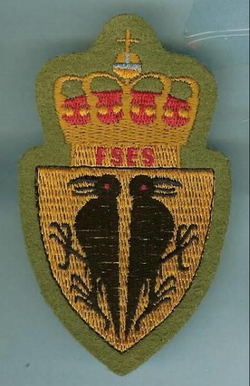The Norwegian Armed Forces Intelligence School
(University, Deep state milieu) | |
|---|---|
 | |
| Motto | Non favet fors nisi mente praeparatis |
| Formation | 1958 |
| Headquarters | Oslo, Norway |
| Interests | Integrity Initiative/Cluster/Norway, Norway/Deep state |
| Norwegian intelligence school | |
The Norwegian Armed Forces Intelligence School (FES) is a Norwegian military intelligence school in Lutvann base in Oslo. Many of the alumni, especially from the selective Russian course are reserve officers and hold key positions in business, public administration and academia.
Contents
History
The school was formerly known as the Norwegian Intelligence Service's weapons school (EVS), the Norwegian Armed Forces Intelligence College (FEH) and the Norwegian Armed Forces School of Intelligence and Security (FSES).
Military language course in Russian was first organized in 1954 to train interrogators for the mobilization defense. This course was organizationally placed under the command of the King's Guard (historically regarded as the ideologically most loyal unit). In 1970, the school was renamed the Armed Forces School of Intelligence and Security and moved to Akershus Castle and Fortress and on to Lutvann in 1978–79.
In 1978, the so-called "A-course in Russian" was approved as a subject at the University of Oslo. From 1979, the same course also received status as a non-commissioned officer school. Today, the school offers both full bachelor degrees in intelligence and part time further education offers.
The school's motto is Non favet fors nisi mente praeparatis ("The prepared mind makes the best use of opportunities"), while the Norse mythology ravens Hugin and Munin emboss the school's logo.
Activities
In 2019, admission will be made to an educational course consisting of Russian language, intelligence subjects, and officer training. The education will last for 2.5 years. This entails 2 years of professional training in intelligence and language, as well as a fifth semester with officer training and intelligence / intelligence management.[1]
The School of Intelligence conducts its research and development activities through the Center for Intelligence Studies (SES). The center conducts targeted research for the intelligence community and uses both open and graded source material. The researchers at SES teach in the school's other departments.
The school's academic structure over the next twenty years was stable with a continued clear focus on Russian and Soviet military capabilities.
After focusing on the Russian and the Soviet Union for the first 40 years, from the end of the 1990s, the school began a careful adaptation to a broader focus, by first increasing its linguistic focus. In addition to Russian and later Arabic, both of which became the school's permanent language areas, the school has studies in Bosnian/Croatian/Serbian, Albanian, Pashto and Dari. Military education was also markedly improved as the language operators' everyday lives became more and more demanding. Especially during the operations in Afghanistan, the language operators were often used in the front line.
The military language course in Russian
The Russian course is considered by many to be an elite education, and is an old boys network for the intelligence services. During the mandatory conscription era, the requirements for academic skills for admission were very high. A large proportion of those who have completed the Russian course hold key positions in business, public administration and academia[2], and probably hold a status as reserve officers. Among those who have taken the course are Francis Sejersted, Lars Roar Langslet, Einar Førde, Johan Jørgen Holst, Per Egil Hegge, Jahn Otto Johansen, Bjørn Bue, Nicolai Tangen[3],Iver Neumann[4], Fredrik Sejersted, Henrik Syse, Christian Syse, Hallvard Bakke, Stian Slotterøy Johnsen, Martin Skancke, Helge Blakkisrud, Torbjørn Aalbu, Jostein Børtnes, Svein Lie, Elnar Seljevold, Hugo Overgaard, Nils August Andresen, Jon Øyvind Eriksen, Siri Lill Mannes, Trygve Helgaker, John Ole Askedal, Leif Terje Løddesøl,Fridtjof Frank Gundersen, Terje Mathiassen, Birger Steen, Jostein Helge Bernhardsen, Oddbjørn Langlo, Ingjald Ørbeck Sørheim, Helge Ole Bergesen, Bjørn Bue, Peter Skagestad, Bjørn Stordrange, Brynjar Lia, Nils Morten Udgaard, Geir Hønneland, Abraham Foss, Jarle Simensen,Helge Hveem, Stein Bråten, Geir Kjetsaa, Dag Mjaaland
Through its leadership courses, The Norwegian Defence University College createts similar networks.
- Full article: Norwegian Defence University College
- Full article: Norwegian Defence University College
Alumni on Wikispooks
| Person | Born | Died | Nationality | Summary | Description |
|---|---|---|---|---|---|
| Einar Førde | Norway | Politician Editor Deep state functionary | Director-General of the Norwegian Broadcasting Corporation. | ||
| Per Egil Hegge | 6 March 1940 | Norway | Journalist Editor | Spooky Norwegian journalist and editor | |
| Johan Jørgen Holst | 29 November 1937 | 13 January 1994 | Norway | Politician | Norwegian Minister of Foreign Affairs. "Worked himself to death" aged 56, 4 years after his first and last Bilderberg |
| Lars Roar Langslet | 5 March 1936 | 18 January 2016 | Norway | Double Bilderberg Norwegian Minister of Culture | |
| Francis Sejersted | 8 February 1936 | 25 August 2015 | Norway | Academic | |
| Nicolai Tangen | 1966 | Norway | Hedge fund manager | Manager of the huge Norwegian Sovereign Wealth Fund | |
| Nils Udgaard | 16 April 1940 | Norway | Journalist Editor | Spooky Norwegian politician |
References
- ↑ https://forsvaret.no/karriere/utdanning/sprak-og-etterretningsutdanning
- ↑ https://no.wikipedia.org/wiki/Det_milit%C3%A6re_spr%C3%A5kkurs_i_russisk#refDN2013mars02
- ↑ https://no.wikipedia.org/wiki/Det_milit%C3%A6re_spr%C3%A5kkurs_i_russisk#refVG20201010
- ↑ http://www.nupi.no/Om-NUPI/Medarbeidere/Tidligere-ansatte/Iver-B.-Neumann